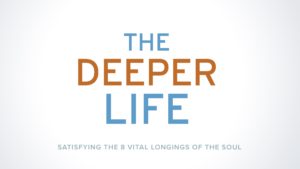Two Eternally Significant Questions You Must Answer
I’ve heard it said that there are ultimately only two questions that matter in this life. First, God asks, “What did you do with My Son?” This is the question of genuine salvation. Second, He asks, “What did you do with what I gave you?” This is the question of faithful stewardship.
There are ultimately only two questions that matter in this life. First, God asks, “What did you do with My Son?” This is the question of genuine salvation. Second, He asks, “What did you do with what I gave you?” This is the question of faithful stewardship.
It is the nature of those who rightly answer the first question to passionately desire to rightly answer the second question. It is the sad destiny of those who pretend, or outright reject, a relationship with the Son who ultimately fumble their answer to the second question. The consequences of both are eternal.
What Has God Entrusted to You?
Most of us are familiar with the parable of the talents told by Christ in Matthew 25:14-30. Like the drama of modern-day fund managers, it is the story of three servants entrusted with various amounts of money. Each eventually faced a serious and substantial accountability for their stewardship. In the story, they received a significant amount of silver. One received five talents (a specific measurement), another two talents, and the third one talent. After a long journey the master returned home to commend the first two and condemn the third. Two “doubled their money” while the third simply buried his talent in the ground and did nothing with it.
I see some relevant lessons for us in this memorable story. Let’s break them down.
Sovereign Distribution of Capacity
The servants received differing amounts from their master. Why? We do not know for certain but we do know that Christ gives all of us greater or lesser opportunities based on His sovereign plan. As 1 Corinthians 12:11 says, He distributes “to each one individually as He wills.” We are not to compare our divinely-determined capacity with that of others, but to accept what He has entrusted to us and flourish as a faithful and fruitful steward of His gifts. We will only give an account for what He has given specifically to us, not what He has given to others.
We are not to compare our divinely-determined capacity with that of others, but to accept what He has entrusted to us and flourish as a faithful and fruitful steward of His gifts. We will only give an account for what He has given specifically to us, not what He has given to others.
The Telling Test of Time
One very interesting element of the story is the line, “After a long time the lord of those servants came and settled accounts with them.” Many believers are fast out of the blocks in serving the Lord. They start like a rabbit and finish like a snail. Our stewardship is a marathon, not a sprint. The “good and faithful” servants in this story demonstrated an enduring stewardship and were found ready when their time of reckoning finally occurred.
Many believers are fast out of the blocks in serving the Lord. They start like a rabbit and finish like a snail. Our stewardship is a marathon, not a sprint.
Two Categories of Servants
Christ describes two kinds of stewards in this story. The first two were “good and faithful” while the third was “wicked and lazy.” Without making too much of this, I would propose that our approach to the Christian life falls into one of those two categories. The determining factor is not our personality or natural energy level. Rather, it is our attitude about what we need to do with what the Lord has entrusted to us.
In the parable, the “good and faithful” servants had the foresight to work diligently and experience a multiplication of what they were given. The “wicked and lazy” servant was incorrect in his assumptions and simply put the money in the ground. Each of us must ask, “What am I doing with what the Lord has given me? Am I making the most of every opportunity? Are my gifts dormant and laying in storage until some other day?” The choice is clear and the ramifications are serious.
Each of us must ask, “What am I doing with what the Lord has given me? Am I making the most of every opportunity? Are my gifts dormant and laying in storage until some other day?” The choice is clear and the ramifications are serious.
The Fundamental Folly of the Lazy
At the source of a forgotten stewardship we find a flawed view of the Master. The wicked and lazy servant offered this excuse for his failure: “Lord, I knew you to be a hard man, reaping where you have not sown, and gathering where you have not scattered seed. And I was afraid, and went and hid your talent in the ground.” In the story, it is very clear that this is a gross misconception of the character of the master. The master responded by noting that even if that were his nature, the servant should have at least put the money in the bank and received some interest.
Ultimately, this is the difference between the two categories of servants. “Good and faithful” believers know their Master, His ways, His expectations, and His faithful reward. “Wicked and lazy” servants are full of excuses but ultimately lack a living, truthful relationship with their Master. Their terrible eternal destination is the just reward of their willful ignorance and pretense.
“Good and faithful” believers know their Master, His ways, His expectations, and His faithful reward. “Wicked and lazy” servants are full of excuses but ultimately lack a living, truthful relationship with their Master.
The Fair and Joyful Reward of the Lord
In a fascinating twist of the plot, the master then takes the one talent from the unfaithful servant and gives it to the first servant who already had ten. Jesus’ words are exact and riveting: “For to everyone who has, more will be given, and he will have abundance; but from him who does not have, even what he has will be taken away” (v. 29).
Those who possess eternal life demonstrate their true knowledge of Master Jesus by their eager and enduring stewardship of what He has given them. Their reward is described beautifully: “Well done, good and faithful servant; you have been faithful over a few things, I will make you ruler over many things. Enter into the joy of your lord” (vv. 21 & 23). They will receive not just the fulfillment of faithful stewardship in this life, but abundant blessings in heaven.
Those who possess eternal life demonstrate their true knowledge of Master Jesus by their eager and enduring stewardship of what He has given them.
Those who pretend a relationship, although given opportunity to respond, will lose whatever they have accumulated – whether riches, achievements, or fame. They may gain the whole world – but they will lose it all in the eternal evaluation.
A Wise, Thoughtful, Diligent Life
Ephesians 5:15–17 gives a similar and serious admonition: “So be careful how you live. Don’t live like fools, but like those who are wise. Make the most of every opportunity in these evil days. Don’t act thoughtlessly, but understand what the Lord wants you to do” (NLT).
William Arthur Ward notes, “Opportunities are like sunrises. If you wait too long, you miss them.” This life is a vapor. Today is the day to embrace and execute all God has entrusted to you.
Thomas Edison commented, “Most people miss opportunity because it is dressed in overalls and looks like work.” Stewarding the opportunities and gifts God has entrusted to us is often rigorous but always rewarding, whether on this earth or in eternity. God gives abundant grace to faithful hard-working stewards. Paul testified, ‘But by the grace of God I am what I am, and his grace toward me was not in vain. On the contrary, I worked harder than any of them, though it was not I, but the grace of God that is with me” (1 Corinthians 15:10). Later in that same chapter he encourages us with these words: “Therefore, my beloved brothers, be steadfast, immovable, always abounding in the work of the Lord, knowing that in the Lord your labor is not in vain” (1 Corinthians 15:58, ESV).
By His grace, let us choose wisely and labor earnestly until we meet our Master. We will see Him sooner than we realize, and His reward for the faithful will be more glorious than we can imagine.
____________________________________________________________________________________________

Our teaching on The Deeper Life has proven to be a trusted path to a life of faithful stewardship. In the chapter on “Time” we propose that we must all be wise and “find Kairos in the chaos of our chronos.” You can unpack the mystery and power of this truth by ordering your copy of the full book, the 21-day quick study, or the small group series today at https://store.strategicrenewal.com.
____________________________________________________________________________________________
Copyright © 2021 Daniel Henderson. All rights reserved.



